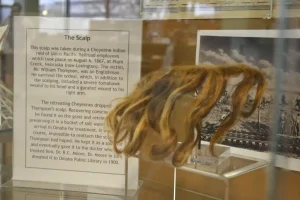
As I child I played cowboys and Indians. We used to fire the fake rifles at the frontier fort on Tom Sawyer Island in Disneyland. Today you cannot do that since it is politically correct to believe that before the arrival of universally evil Europeans all Indians were peace-loving environmentalists. The belief is false. But The Walt Disney Company in California has bought the falsehood, closing the Disneyland frontier fort so that children can no longer pretend to defend civilization. (In Florida, where civilization yet survives, The Walt Disney Company still allows children to play in the Magic Kingdom version of the frontier fort.)
(p. E1) I’m leading off with my nomination for the most bizarre item ever exhibited in Omaha. It’s been around for more than 150 years, and it’s a shame if you haven’t seen it–that is, as long as you’re not too squeamish It used to belong to William Thompson, an Englishman who was employed by Union Pacific on the new transcontinental railroad.
In 1867, while working at Plum Creek Station, near Lexington, Nebraska, Thompson was scalped by a band of the Northern Cheyenne. He was left for dead, but when he recovered consciousness, he found his scalp not far away. Remarkably, he put it in a bucker of salt water and headed to Omaha on a rescue train. On arrival he asked Dr. Richard Moore to reattach it. That wasn’t possible, so he kept it as a souvenir. Later he gave the preserved scalp to Moore, who donated it to the Omaha Public Library in 1900. Since then, it has been exhibited from time to time at both the old Union Pacific Museum and the main library. OPL took it off public exhibit in 1977, but it made a surprise appearance in 2012 for the library’s 140th anniversary celebration. I am grateful to library specialist Lynn Sullivan for a private showing last year of the desiccated scalp, complete with a nice shock of sandy-orange hair.
For the full story see:
Marks, Bob. “Weird, Wild and Wonderful Exhibits Here.” Omaha World-Herald (Sunday, March 21, 2024): E1-E2.

